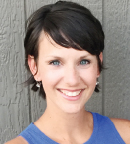When I was diagnosed with diffuse large B-cell lymphoma (DLBCL) in 2013, I used to joke that if I had to get cancer, this wasn’t a bad one to have. At just 32, I was otherwise healthy, and my prognosis for a cure was good, according to my oncologist. So I felt confident that once I underwent treatment, I could resume my life and continue taking care of my three young children, who were aged 7, 5, and 3 at the time.
My oncologist recommended the standard-of-care chemotherapy regimen for DLBCL: six rounds of rituximab (Rituxan), cyclophosphamide, doxorubicin, vincristine, and prednisone, and within weeks, I was in remission. Cancer was now behind me, I thought, and I could look forward to a long, healthy future.

Emily Dumler
However, my reprieve from cancer lasted only 1 year, just long enough for me to start feeling like my life had returned to normal and the disease was in my past. Hearing the news that my lymphoma had recurred turned my world upside down and was much more difficult to cope with than my original diagnosis.
I think I was too naive about cancer to completely comprehend how devastating this disease could be. There was no history of cancer in my family, and my friends—most of whom were my age—also had no direct experience with the disease. I was the first one in my immediate family and social circle to be diagnosed with cancer, and now I was facing all the treatment side effects and family upheaval again. Still too innocent about the relentlessness of cancer, I didn’t realize that cure would now be more difficult to achieve and that the treatment needed to get me there would mean spending months away from my husband and children and nearly kill me.
Getting a Second Opinion
MY ONCOLOGIST said the next best shot at a cure for me was an autologous stem cell transplant. But after high-dose chemotherapy failed to significantly reduce the amount of lymphoma cells in my body to proceed with the transplant, it was recommended that I aim for an allogeneic transplant instead, and we went looking for a bone marrow donor whose human leukocyte antigens were an acceptable match to mine.
I was generally happy with the care I had been receiving locally, but there had been differing opinions among members of my medical team about my lymphoma diagnosis and whether I actually had the diffuse large B-cell subtype. So while we awaited news about a donor match, my husband and I decided to travel out-of-state to an academic cancer center for a second opinion.
“My faith has always been strong, but this experience has taken it to a new level, and I appreciate life so much more than I did before my diagnosis.”— Emily Dumler
Tweet this quote
The oncologist we consulted concurred that I did, in fact, have DLBCL but disagreed on the necessity for an allogeneic transplant. He said a different salvage regimen of gemcitabine, busulfan, and melphalan should be sufficient in reducing the number of cancer cells and get me close enough to remission to harvest my stem cells for a transplant.
I had the autologous transplant in January 2015, and 4 months later, I was told the treatment was unsuccessful. I was so weakened from the transplant—my weight had dropped to 88 pounds—and my lymphoma was so aggressive, my oncologist said I had 6 months to live.
Taking a Chance
I WAS OFFERED an attempt at a second transplant, but I knew I was too sick to go through the rigors of another high-risk procedure. When I returned home, my local oncologist said clinical trials were underway investigating a type of cellular immunotherapy called chimeric antigen receptor (CAR) T-cell therapy, and he thought I was a good candidate for the trial.
With nothing left to lose, I applied for the last spot open in the study and became the third person in the world to receive the experimental therapy. I’ve been in remission ever since, and I finally have my life back.
(Editor’s Note: On October 18, 2017, the U.S. Food and Drug Administration (FDA) approved axicabtagene ciloleucel [Yescarta] in the treatment of certain types of relapsed or refractory large B-cell lymphomas.)
Embracing the Normalcy of Life
I KNOW MANY cancer survivors want to put their disease experience behind them and just look forward to the future, but I feel differently. I want to remember everything about my cancer experience, including the most difficult times of undergoing treatment, relapsing, being separated from my young children and my husband for months at a time, and, after all that, nearly dying. Cancer has changed me and put me in a different emotional place. My faith has always been strong, but this experience has taken it to a new level, and I appreciate life so much more than I did before my diagnosis.
But more importantly, I’m grateful that my participation—and the participation of all the other patients—in the axicabtagene ciloleucel CAR T-cell clinical study led to FDA approval of this important new therapy and that I made a contribution to potentially saving many lives that otherwise would be lost to large B-cell lymphomas. I never want to forget that.
Cancer is all-consuming. It took over my life and nearly killed me. Today, I embrace the normalcy of everyday living: raising my family, working, and enjoying being with friends. I’ve been given a second chance at life, and I’m not wasting a minute of it.
Ms. Dumler lives in Shawnee, Kansas. She is Director of Religious Education at Sacred Heart of Jesus Catholic Church. ■
Editor’s Note: Columns in the Patient’s Corner are based solely on information The ASCO Post received from the survivors interviewed and should be considered anecdotal.

